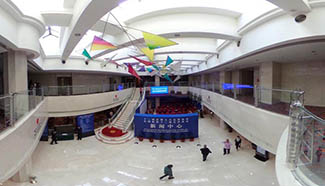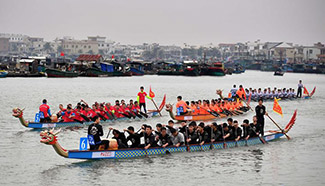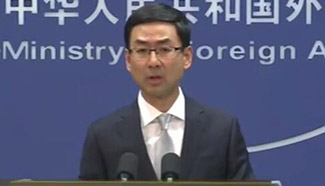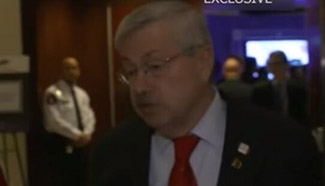by Saud Abu Ramadan
GAZA, Feb. 27 (Xinhua) -- The Islamic Hamas movement, which has been ruled Gaza for almost 10 years, chose early this month a new leadership in an internal secret elections. Palestinian analysts said that Hamas is seeking to change its future political and military priorities.
It is a key issue to achieve the internal Palestinian reconciliation, re-drafting the internal Palestinian situation and strengthening the internal front, said Taher al-Nunu, a Hamas leader in Gaza.
He also underscored the reformulation of relations between Hamas and other countries in the region during visits in both Qatar and Egypt, where he achieved positive results in improving ties with Arab countries.
Regarding challenges of changes in the international politics, he added that "we have to reconsider the latest Israeli position, which requires us to be united with Fatah and other factions" as he mentioned the new U.S. administration under Donald Trump.
Mustafa Sawaf, an Islamist and Gaza-based political analyst, said that Hamas movement's major priorities are stable, but some policies may vary depending on changes of situation in the Palestinian territories, in the region and all over the world.
He referred the changes as the growing conflict of the Palestine with the Israeli occupation and the new Israeli right-wing policies, the conflict in several Arab states, and also the new U.S. president's policies.
Usually, the Internal Hamas elections are held every four years in three different regions -- The West Bank, Jerusalem and the Israeli prisons, which are all one region, the Gaza strip, and The Diaspora. Each region elects 15 Shoura council members, or members of Hamas Parliament.
Then the 45 Shoura council members secretly and internally elect among them the political bureau members, or the top leadership of the movement, which consists of 18 members, and then the 18 members separately convene and choose the chief and the deputies of the politburo.
According to Hamas internal laws, the chief of the movement is not allowed to run for the post of the politburo chief for more than three terms, which had stopped Khaled Mesha'al from running again as the head of Hamas political bureau for a fourth term.
Sources close to Hamas, who spoke on condition of anonymity, told Xinhua they expect that Ismail Haneya, the senior Gaza Hamas leader, is the sole candidate who will take the post of the movement's chief. Mesha'al, according to the sources, is expected to be the chairman of the Shoura Council.
However, so far, the newly elected leaders are still silent and all what had been published in the media was only names of the new elected leaders of the Islamic movement in Gaza Strip.
One of the prominent powerful new Hamas characters, who won in the recent elections, is Yehya al-Sinwar. He was released in the Egyptian-brokered prisoners' swap deal reached between Israel and Hamas in October, 2011. Sinwar, who spent more than 20 years in Israeli jails, was elected as Gaza Strip's top Hamas leader.
Sawaf said he noted the Israeli media campaign of incitement against Sinwar after he was elected as Gaza leader of Hamas movement.
"Israel should know that Sinwar is not a dictator and he is not the only decision maker in the movement. He was elected in a democratic way and all Hamas decisions are made through the Shoura council and by the politburo inside and outside Palestine," Sawaf clarified.
On Monday, Haneya, Sinwar and one of the newly elected leaders of Hamas movement Rawhi Mushtaha held their first meeting in Gaza after the elections. They discussed the arrangements of the soft transition of powers in the movement.
Sinwar also spoke on the phone on Sunday with Khaled Mesha'al, who is based in Qatar, according to Hamas emailed press statement. The two leaders discussed the situation in Gaza, including the recent Israeli threats to the movement.
Hamas movement was founded in December 1987 by late spiritual leader Sheikh Ahmad Yassin, who was assassinated by Israel in April 2004. Israel and the United States listed the movement among the world terrorist groups and imposed an embargo on the Gaza Strip after it refused to recognize Israel.
The movement has been ruling the Gaza Strip since the summer of 2007 after it ousted the security forces of Palestinian president Mahmoud Abbas. Since then, efforts and mediation to end the internal split between the two sides had so far failed.












